Tuesday Poster Session
Category: Colon
P3715 - Multiple Myeloma and Amyloidosis Presenting as Chronic Diarrhea
Tuesday, October 29, 2024
10:30 AM - 4:00 PM ET
Location: Exhibit Hall E

Has Audio
- LK
Lena Kawji, MD, MS
Louisiana State University Health
Shreveport, LA
Presenting Author(s)
Lena Kawji, MD, MS1, Michael Tran, MD1, Sudha Pandit, MD2
1Louisiana State University Health, Shreveport, LA; 2LSU Health, Shreveport, LA
Introduction: Gastrointestinal involvement is a rare presentation of plasma cell dyscrasias. GI manifestations can occur due to deposition of clonal plasma cells or the accumulation of immunoglobulins or its fragments in the GI tract and interfere with organ function. We present a case of chronic diarrhea with workup revealing multiple myeloma and amyloidosis.
Case Description/Methods: A 61-year-old male with no past medical history presents with the complaint of chronic diarrhea for one year. Patient states stools are loose and watery, and that he has about ten episodes a day. Patient endorses an unintentional 60-pound weight loss over the last six months and asymptomatic hypotension, but denies abdominal pain, nausea, melena, hematochezia, fevers, or recent antibiotic use. On admission, patient afebrile, pulse 86 bpm, and BP 87/58 mmHg. Patient has dry mucous membranes and his abdomen is soft, non-distended, and nontender. Stool culture, Shiga toxin, Clostridium difficile, stool WBC, and calprotectin are negative. Fecal elastase is 139 mcg/g. Osmotic gap is 66 mOsm/kg. Celiac panel negative. EGD and colonoscopy were performed. Biopsies from the small intestine and colon were significant for amyloid deposition. Congo red stain is positive and chromogenic in situ hybridization for the kappa and lambda light chains shows a polyclonal plasma cell infiltrate. Patient was referred to Hematology-Oncology and underwent a bone marrow biopsy, and pathology was significant for multiple myeloma and AL amyloidosis. Patient was started on daratumumab, cyclophosphamide, bortezomib, and dexamethasone.
Discussion: Multiple myeloma is a hematologic malignancy characterized by the uncontrolled clonal expansion of malignant plasma cells within the bone marrow. Amyloidosis is characterized by insoluble abnormally folded proteins accumulating and depositing in various tissues, and hence leading to organ dysfunction. Among individuals diagnosed with multiple myeloma, over 10% have coexisting amyloidosis(1). Though GI tract involvement is uncommon in these plasma cell dyscrasias, they can occur anywhere along the tract, with the small bowel being the most affected region, followed by the colon. Common symptoms include diarrhea, weight loss, abdominal pain, bleeding, or obstruction. Tissue biopsy is needed for definitive diagnosis. Due to non-specific symptoms, GI manifestations of plasma cell dyscrasias can present similarly to other diseases and be easily misdiagnosed, so it is important to keep in consideration.
Disclosures:
Lena Kawji, MD, MS1, Michael Tran, MD1, Sudha Pandit, MD2. P3715 - Multiple Myeloma and Amyloidosis Presenting as Chronic Diarrhea, ACG 2024 Annual Scientific Meeting Abstracts. Philadelphia, PA: American College of Gastroenterology.
1Louisiana State University Health, Shreveport, LA; 2LSU Health, Shreveport, LA
Introduction: Gastrointestinal involvement is a rare presentation of plasma cell dyscrasias. GI manifestations can occur due to deposition of clonal plasma cells or the accumulation of immunoglobulins or its fragments in the GI tract and interfere with organ function. We present a case of chronic diarrhea with workup revealing multiple myeloma and amyloidosis.
Case Description/Methods: A 61-year-old male with no past medical history presents with the complaint of chronic diarrhea for one year. Patient states stools are loose and watery, and that he has about ten episodes a day. Patient endorses an unintentional 60-pound weight loss over the last six months and asymptomatic hypotension, but denies abdominal pain, nausea, melena, hematochezia, fevers, or recent antibiotic use. On admission, patient afebrile, pulse 86 bpm, and BP 87/58 mmHg. Patient has dry mucous membranes and his abdomen is soft, non-distended, and nontender. Stool culture, Shiga toxin, Clostridium difficile, stool WBC, and calprotectin are negative. Fecal elastase is 139 mcg/g. Osmotic gap is 66 mOsm/kg. Celiac panel negative. EGD and colonoscopy were performed. Biopsies from the small intestine and colon were significant for amyloid deposition. Congo red stain is positive and chromogenic in situ hybridization for the kappa and lambda light chains shows a polyclonal plasma cell infiltrate. Patient was referred to Hematology-Oncology and underwent a bone marrow biopsy, and pathology was significant for multiple myeloma and AL amyloidosis. Patient was started on daratumumab, cyclophosphamide, bortezomib, and dexamethasone.
Discussion: Multiple myeloma is a hematologic malignancy characterized by the uncontrolled clonal expansion of malignant plasma cells within the bone marrow. Amyloidosis is characterized by insoluble abnormally folded proteins accumulating and depositing in various tissues, and hence leading to organ dysfunction. Among individuals diagnosed with multiple myeloma, over 10% have coexisting amyloidosis(1). Though GI tract involvement is uncommon in these plasma cell dyscrasias, they can occur anywhere along the tract, with the small bowel being the most affected region, followed by the colon. Common symptoms include diarrhea, weight loss, abdominal pain, bleeding, or obstruction. Tissue biopsy is needed for definitive diagnosis. Due to non-specific symptoms, GI manifestations of plasma cell dyscrasias can present similarly to other diseases and be easily misdiagnosed, so it is important to keep in consideration.
Disclosures:
Lena Kawji indicated no relevant financial relationships.
Michael Tran indicated no relevant financial relationships.
Sudha Pandit indicated no relevant financial relationships.
Lena Kawji, MD, MS1, Michael Tran, MD1, Sudha Pandit, MD2. P3715 - Multiple Myeloma and Amyloidosis Presenting as Chronic Diarrhea, ACG 2024 Annual Scientific Meeting Abstracts. Philadelphia, PA: American College of Gastroenterology.
